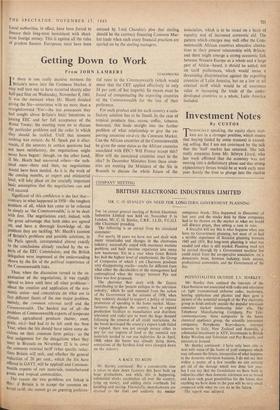Selecting the Industrial Few
I have already recommended a few insurance, brewery, store, food and property shares. It is in the industrial field where selection becomes so difficult. I cannot, for example, follow those who would buy BMC immediately •(in spite of its brilliant Italian designer). A fall of only 10 per cent. in vehicle output resulted last year in a 50 per. cent. drop in group profits. I would feel safer in the components, and it was
COMPANY MEETING
RECORD earnings for the sixth successive year were reported by Sir Ivan Stedeford, G.B.E., Chairman of Tube Investments Limited, in his annual review posted to stockholders yesterday (16th November, 1961).
On a turnover expanded by 20%, total trading profits, after depreciation, he said, increased by £1,753,660—over 9%—to £20,961,123, despite a reduction of £1,700,000 in the earnings of the British Aluminium Group. Without the British Aluminium figures, pre-tax profits of the, main TI Group in- creased by over £3,500,000, taking in the income derived from new subsidiaries consolidated during the year. Excluding those new subsidiaries, profits exceeded the record earnings of the previous year by some £800,000.
In addition to the lower aluminium results, he con- tinued, the operations of the Cycle and Electrical Divisions were less rewarding, owing to official re- straint and keener competition. Activity in the capital goods and kindred industries remained at a high level, and kept the Steel Tube, Engineering and General Divisions busy, although margins were under growing pressure. The steelmaking companies, on a much increased turnover, did well, and served the main purpose for which they were acquired and were being developed—assuring TI with adequate supplies of the high quality steel it must use. But they were unfairly burdened by having to carry last year's additional costs without an adequate recom- pense in their own prices.
After giving full consideration to all relevant cir- cumstances, including national policy, the Board recommended a final dividend of 7% making again a total distribution for the year of 14%.
The capital cost of TI's existing development pro- gramme (excluding the aluminium companies whose finances had been put on an independent basis) was estimated at £75,000,000 spread over the next five years or so. Financing it should not set a serious problem. With existing quick assets of £25,000,000 (excluding B.A.), plus cash flow, and allowing for
Thomas Tilling
Coming back to motors, the obverse to the de- clining British share of the continental market in cars is the rising share of the British market won by continental cars such as the Volks- wagen and Mercedes. THOMAS TILLING has long been the sole concessionaires of the former and by acquiring Mercedes-Benz (GB) in June, 1960, became the sole concessionaires of the latter also. Last year the net profits of the two Tilling subsidiaries engaged in importing German cars rose by 46 per cent.: they were responsible for nearly a quarter of the total imports of foreign cars. If Great Britain joins the Common Market and continental cars no longer have to jump a tariff fence of 30 per cent., it is reasonable to suppose that the Tilling motor subsidiaries will once again greatly increase their sales and profits. In 1960 the distribution of motor-cars accounted for about 23 per cent. of the net trading profits of Thomas Tilling, being second only to the 24 per cent, accounted for by build- ing supplies and services. The parent company's total net profits increased by over 100 per cent. to £2,780,000, of which 63 per cent. was due to improved trading and 37 per cent. to new in- terests. The dividend of 20 per celit. was paid out of earnings of 35 per cent. and next year a further increase in dividends is probable. The 4s. shares at 25s., to yield 3.2 per cent., are therefore not too expensive as a 'growth' stock. As my readers know, I dislike industrial hold- ing companies as investments, but clearly Tilling is unique, the exception which proves the rule.






































 Previous page
Previous page